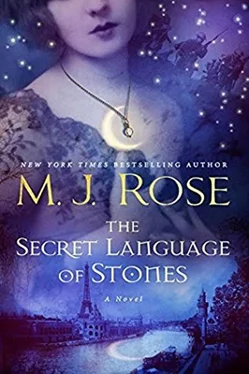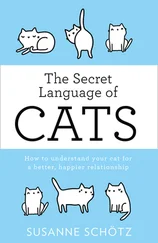I shook my head.
Anna pointed to a spot off center to the right. Straining, I saw a fissure inside one of the rocks, like a break in a cliff.
“I see you here on the edge. And Grigori on the other side. He has his hand out to you. I believe it means you can be the bridge-helping him find his fate. He needs you to give him that chance. I know you are afraid. I’m afraid too. There are storms brewing in these occlusions. Here”-she pointed to a gray mass-“and here. I’m not certain. It could be the war. Or it could be the conflict inside of you. You can’t stay afraid of forming attachments because of Timur.”
I nodded.
“When I see you in the orb, there are threads wrapped around you, enclosing you. I think they’re the voices you hear, creating a kind of barrier between you and your potential both as an artist and as a woman. You are surrounded by the dead. You are allowing them to prevent you from living a full life.”
Her words chilled me. Her second sight showed her Jean Luc even though she hadn’t named him. And she’d referred to threads. That’s what my mother had described to me too.
“You think you can avoid pain by not needing anyone. That if you never love anyone who you can lose, then you’ll never feel loss. But it’s not true. We’re made to love. Even if you think you can stop yourself from feeling, stop yourself from living, your emotions will find a way. They’ll trick you when you least expect it.”
They already had, I thought. My reluctance to form an attachment to a living man had resulted in my forming an attachment to a dead one.
“You are close to the time when you are going to be forced to make a choice between those who are dead and those who are living. Don’t choose wrong, Opaline. I promise, the pain you are suffering is worse than the pain you are afraid of.”
I returned to my room to find a note Grigori had left me, saying he had an errand to attend to and asking if I would meet him at Café de la Paix. The restaurant was only a short walk from the Palais, but it had started raining once more.
I didn’t really want to go out, but there was no way to reach Grigori and cancel. Not showing up would be too rude. So, feeling trapped but resigned, I changed out of my gored black skirt, white middy blouse, and low-slung belt. Such was my self-imposed work uniform. I owned two identical blouses and skirts, and when one needed laundering, I wore the other. No visible jewels. The gems in the shop were supposed to shine, not those of us who worked there.
From my closet, I pulled out a bottle green silk chemise and held it up against my body. No, too flirty for my mood. Instead, I chose a higher-necked maroon silk dress that set off my hair color without being suggestive.
Checking my reflection in the mirror, I thought the more circumspect outfit a better choice. Plus, the dress would match my ruby silk umbrella with its silver repoussé handle, my great-grandmother’s birthday present to me. Once opened, it revealed celadon-colored silk printed with a profusion of roses in luscious shades of pink. Like having a garden protecting you from the rain.
As I turned away from the mirror, I saw the gold chain around my throat glitter. I removed Jean Luc’s talisman. Grigori might ask about it, and I didn’t have any answers.
Next, I hesitated over the tray of perfume on my vanity. My instinct led me to forgo the House of L’Etoile’s more wanton L’Eau de L’Amour for their gentler Joie de Vivre . I dabbed some of the floral scent behind my ears, ran my hands through my hair, and then, umbrella on my arm, I left my room, locking the door behind me.
Outside, sheltered from the rain by the arcade, I hugged the wall as I headed toward the Palais’s exit. Most of the shop windows I passed were crisscrossed with tape to protect the glass from shattering when bombs shook the city. At La Fantaisie Russe, Monsieur had installed a second plate of glass abutting the window so he could fully show the display cases he was so proud of. But several store owners used the adhesive inventively, making decorative shapes showcasing their wares between the openings. Creative protection from Bertha, I thought.
I walked halfway to the exit, coming up to a shoe store abandoned months before that had remained empty since. Its owner, another victim of war. There were a dozen such shops around the Palais that had been thriving businesses when I had first arrived in 1915.
Of all of the closed shops, the shoe boutique made me saddest because I’d gotten to know Monsieur Maillot a bit and liked his off-color jokes and lovely shoe designs. The way he mixed fabrics and colors, while within the bounds of taste, still shocked a bit. And when he helped you, his fingers caressed the boots or dancing shoes you’d asked to see like a lover. He delighted in his own creations, and it charmed me.
As I passed by, I thought I saw a shadow shift and peered into the darkened interior. Suddenly, too fast for me to react, a hand reached out and grabbed my arm, roughly pulling me inside. I felt my shoulder wrench. Saw nothing but darkness. Then a stench. Wine. Vetiver. Sweat. Garlic.
It wasn’t Monsieur Maillot pulling me into his store. Of course not. He’d died at the front. This was some stinking stranger dragging me deeper into the shadows. Suddenly his cold fingers pressed a paper into my hand. Then, grunting, he shoved me in the opposite direction. Sprawling, I tripped on a warped floorboard and landed in a pile of dirty, dusty rags and discarded boxes.
For a moment, I sat there on the floor, stunned. Not comprehending what had happened. My breath came in ragged gasps. My pulse pounded. I felt a damp breeze and realized the door to the shop hung wide open.
I watched a shadow cross under the arcade. My assailant fleeing. And I was too dazed to get up and go after him.
Standing, I tested my ankles. Nothing broken for sure, not even sprained. My left shoulder throbbed. My right elbow ached. Probably I’d banged it on the wall as I fell. Brushing off my skirt, I took a few deep breaths and walked outside.
I stopped for a moment and leaned against one of the columns, looking out into the garden. I considered going back to my apartment. I certainly had an excuse. But the thought of being alone disturbed me more than the idea of meeting Grigori. I badly wanted a glass of wine and knew he’d probably ordered a bottle already.
Then I remembered the paper and looked down. My left hand still clutched the crumpled sheet my attacker had shoved into my fingers.
Written in black ink were the words:
Arretez-vous , Mademoiselle.
A warning to stop. But stop what?
As I continued on under the arcade, I tried to grasp the meaning of the words and the attack. What had happened? Certainly not a thwarted sexual assault? I’d read about soldiers, sick with war fever, desperate for companionship, who came home and raped Parisians. But the man in the shop hadn’t touched me except to pull me inside the shop, uncurl my fingers, and push me out of his way.
I exited the Palais out onto the street, with each step more confused but less panicky. Above me, the velvet twilight sky was unaffected by my recent attack and the afternoon’s bombing. But around us, the people on the street were very much reacting to the latest tragic assault on the city. After an air raid-whether bogus or real-people poured out of their homes, crowded the cafés, the streets. The relief at the end of the raid needed to be expressed. No one wanted to be alone, cowering. We believed it was our civic duty to celebrate that we’d survived yet another German threat. That they could scare us but not defeat us. We would not allow them to bomb the joie de vivre out of us for more than an hour or two at a time.
Читать дальше












